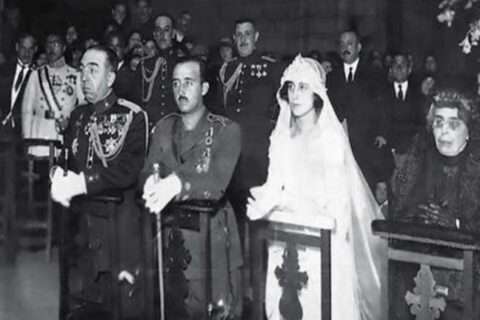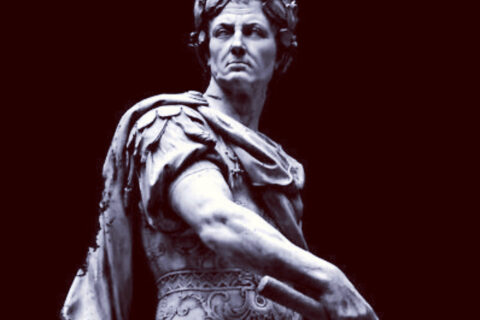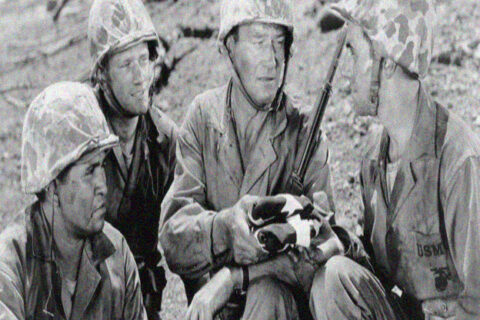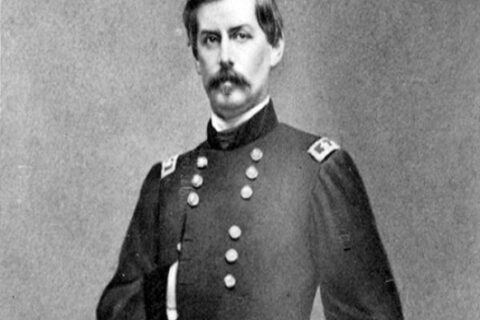This is a little known historical event that I’ve always found incredibly interesting.
Some context: In 1798, there was a massive rebellion in Ireland led by an organization called the “United Irishmen.” Over 50,000 people were involved in the uprising, which was brutally crushed with tens of thousands killed in the aftermath.
One of their sympathizers was a man by the name of Robert Emmet, who was the son of a Dublin doctor. Although Protestant, Anglo-Irish, and of noble blood, Emmet was a supporter of the United Irishmen, who sought to establish an Irish Republic. Attending Trinity College, he became the secretary of what was essentially the “United Irishmen Club” and was expelled in April 1798 – less than a month before the bloodbath began.
Fleeing to Revolutionary France, Emmet tried to persuade Napoleon Bonaparte to aid in an attempt to free Ireland from British rule. Napoleon was impressed by the young revolutionary’s intelligence and passion, but Emmet was less than enthralled with Napoleon. Emmet saw that Napoleon was simply subjugating smaller countries and integrating them into a French Empire under the pretense of “liberation.” He wished to sign a treaty with Bonaparte, spelling out that France would help establish the Irish Republic but would not involve itself in Irish affairs afterwards. Such a treaty did not occur.
Defeated, Emmet returned to his native country in 1802 and planned for another rebellion. Emmet’s time in France, however, was not wasted. There he mapped out a plan for what was essentially urban guerrilla warfare – blocking off streets, ambushes, and the like. He even developed a new weapon – a folding pike. The pike, the frequent use of which in 1798 made it a symbol of the United Irishmen, was an effective weapon all things considered. But when the element of surprise was paramount, it was hardly the most useful. Emmet and his compatriots invented a folding pike, with a hinge in the center, that could be concealed under a cloak and used for ambushes in urban areas. This was not the only military innovation he sought to utilize – he also set up an arms depot in Dublin that produced Indian-style rockets, similar to those used by the Marathas in their wars against the British.
Emmet kept the rebellion’s plans to himself and a very close group of followers – unlike the disaster in 1798, this was planned as a total surprise for the British administration. The Chief Secretary of Ireland, William Wickham, was a consummate spy and informer, and it is to Emmet’s credit that Wickham never knew about the rebellion until it was already underway. Precautions were taken to that end – in March 1803, Robert Emmet went dark, using only pseudonyms to travel and rent houses in Dublin for the purposes of the uprising.
Having established two depots in Dublin, one of which was situated on Thomas Street and the other on Patrick Street, the rebels set about arming themselves.
On July 16th, 1803, the Patrick Street depot (which held the rockets) exploded, killing one of Emmet’s men. The police, however, assumed that the facility that exploded had been used to produce illegal whiskey, and were thus not tipped off to the oncoming rebellion.
Failing to establish connections with the rebels operating in Wicklow, and there being a likelihood of discovery, Emmet sprang into action on July 23rd, 1803.
The overall plan went something like this:
- Drive up to Dublin Castle in a carriage, on the pretense of taking the officers to a ball. Once the gate opened, the rebels were to attack.
- Men with grappling hooks would scale the walls of Dublin Castle and attack the guards.
- Blow up a mine in the wall of Dublin Castle, then using a house next to it (which Emmet had rented) tunnel in.
- Having captured the administrative center of Dublin, rebels from Kildare would come and join the fight.
- The British troops, confined in the narrow streets of Dublin, would be slaughtered by the pike wielding rebels and their rockets.
- The British would be driven out of Dublin, and rebellions in Wicklow and Ulster would break out and secure Irish freedom.
What ensued was an epic failure.
The men from Kildare who arrived to aid in the rebellion left when they realized Emmet had no muskets to equip them with. The only firearm the rebels had was a pistol – carried by Emmet. Emmet promised that he had ordered guns from a gunsmith, and that they were ready. He sent off one of his men with some money to pay the gunsmith and bring back the firearms – but the man took the cash and disappeared.
The man charged with holding onto the rocket fuses? He misplaced them. The rockets, intended to spread terror amongst the British forces, could not be used.
Many other rebels, who were given the signal on July 23rd to come to Dublin, were shocked to be greeted by Emmet, a 25 year old with no military experience, as their leader. Disgusted, nearly all of them went home.
The night of the 23rd, the dashing young rebel stepped out into Thomas Street wearing a bright green uniform, a cocked hat, white facings, white breeches, and tall boots.
Robert Emmet read out a proclamation, which called for mercy to be shown to British prisoners and loyalists. One can only imagine Emmet’s shock when he heard his men, only eighty of whom had assembled, actually jeering him. This was likely due to the fact that they were blind drunk, having spent the afternoon drinking at pubs in Thomas Street.
Instead of pursuing the complicated three-pronged attack on the Castle, Emmet decided to march up to it and storm the gate. But only twenty of his men followed him. The other sixty had scattered, and began rampaging through the street attacking policemen and soldiers.
Emmet’s glorious rebellion descended into chaos. After seeing a British soldier pulled off his horse and savagely killed, he desperately tried to call off his men to limit the bloodshed. But it was to no avail. Lord Kilwarden, the Lord Chief Justice of Ireland, was dragged from his coach and killed, as was his nephew. This horrific incident, during which an official who had actually shown clemency to United Irishmen in the past was killed by the rebels, was one of many in the bloodbath that day.
Night fell on the 23rd and seventy people lay dead, fifty of whom were rebels and twenty of whom were soldiers or civilians.
Emmet took to his heels, and fled into the countryside. He could easily have fled to France to fight another day, but insisted upon finding his sweetheart, Sarah Curran. He rented a house outside Dublin, where he wrote letters to Sarah, but the army arrived on August 25th. Emmet, who had rented the house with an assumed name, gave a name different to that which the landlady had given. One of the redcoats knocked him down with his musket, and was tasked by his officer, Major Henry Sirr, with detaining Emmet while the rest of the troop interrogated the landlady. After they left, Emmet knocked the guard unconscious and jumped out of a window. Major Sirr, noticing Emmet’s escape, chased after him and tackled him to the ground. Strangely, Sirr apologized to him for the undignified arrest, and Emmet forgave him, saying, in essence, “all’s fair in war.”
After the violent but polite apprehension, the captured rebel was brought to Dublin and stood before a panel of government officials. Emmet responded cooly to their interrogation – joking, playing word games – until the officials produced two letters that they had found on him. The letters were from Sarah Curren – but were unsigned. The officials asked if Emmet would be more amenable to answering their questions if they were to arrest the author of the letters. Emmet broke down, and promised to plead guilty to their charges of treason as long as they let the author be.
Emmet was thrown back into his cell – but there was more to this than he thought. The government had no idea who had written the letters – they believed that the author’s desire to give Emmet “ten small children” (very trad) was code for ten small rockets.
Emmet did not know this. Emmet thought, at that very moment, soldiers were coming to take his sweetheart away in chains. That night, he wrote a letter to Sarah in his cell, begging her forgiveness and apologizing for not having destroyed the love notes. He gave it to one of the jailers – who had sworn to aid Emmet in any escape attempt he made – and the jailer brought the letter to Dublin Castle.
Emmet’s tragic illusion became a reality – his sweetheart, and her family, were now implicated in his catastrophic rebellion! John Philpott Curran, Sarah’s father and an eminent lawyer, attested that Emmet had made up the relationship with his daughter as part of a sick fantasy. John Curran then wrote a furious letter to Emmet, incensed that he had dragged his family into the rebellion.
Emmet, crushed by Curran’s letter, nevertheless wrote a measured response: “The man who feels the coldness of death upon him should not be made to feel any additional coldness.”
John Curran, obviously, would not be Emmet’s lawyer. The lawyer Emmet ended up with, Leonard McNally, was a spy for the British government. After McNally’s death, it was discovered that he was one of the most decisive informers in Irish history, having played a significant role in destroying the cohesion of the 1798 rebellion. His assistant, Peter Burroughs, was sincere and attempted to make a defense of his client.
Emmet stood for twelve hours at the dock as the trial went on, and whenever Burroughs attempted to cross examine a witness, Emmet would stop him, saying it was in vain.
The jury issued its verdict – guilty. Before his sentencing, Emmet issued his “Speech from the Dock.” A consummate orator, the young rebel finished his speech with these famous lines:
“Let no man write my epitaph; for as no man who knows my motives dare now vindicate them, let not prejudice or ignorance, asperse them. Let them and me rest in obscurity and peace, and my tomb remain uninscribed, and my memory in oblivion, until other times and other men can do justice to my character. When my country takes her place among the nations of the earth, then and not till then, let my epitaph be written.“
Emmet’s Speech from the Dock became very popular in America, and is often held up as an example of sublime oration to this day. Emmet defended his rebellion, and his attempt to garner French support, stating that if they did anything but aid in the attempt to gain Irish independence he would “fight them on the beaches.” (Sound familiar? Not a coincidence)
In his cell, during that last night of his life, Emmet slept not a wink. He spent his time drawing out how exactly the rebellion was supposed to have gone, including plans for the rockets. These plans, which were written by Emmet to prove that his rebellion had been well thought out, were taken by the British. The prototypes therein helped develop Congreve Rockets, the “red glare” of which was so famously deployed against Fort McHenry during the War of 1812.
He wrote a letter to Sarah, stating his love for her and how sorry he was for having brought her so much pain and suffering. He wrote to his brother, telling him to treat Sarah as if she were his sister, and to take care of her when he was gone.
On the morning of September 20th, 1803, as Robert Emmet was led out of his cell toward the gallows, he requested to be allowed to write one more letter. His guards took him back, and he jotted down a one page letter to the Chief Secretary of Ireland, William Wickham.
Emmet was then led again to the gallows, situated on Thomas Street, in front of 200,000 spectators. He placed the noose around his own neck, shook hands with the executioner, and gave a short speech. The plank was kicked out from under him, and Robert Emmet died. After hanging for about half an hour, his corpse was placed on a table. He was beheaded, and the executioner held his head aloft, crying “this is the head of the traitor.” His blood ran into the streets, where it was lapped up by dogs, and people came and dipped their handkerchiefs in his blood.
Emmet died betrayed multiple times by those around him and having brought hardship on Sarah, the love of his life. Despite this, he is said to have died with extreme dignity.
Robert Emmet’s body has never been found, and thus he has no grave. Without a grave, there is no epitaph – the final lines of his famous speech were fulfilled.
As for everyone else:
William Wickham received Emmet’s last letter two hours after the execution. The letter, which had a profound effect on it’s recipient, stated that it was not hatred of Britain that motivated Emmet, it was love of Ireland. The letter expressed a vision of Britain and Ireland, independent nations, working side by side and living in peace. Wickham resigned from the British administration that year. In his resignation letter, he wrote that he could not help maintain an administration which he believed was immoral. Retiring to Switzerland, he lived there until his death in 1840. He said of his adversary “had I been an Irishman, I would have joined him [Robert Emmet].” Wickham is best remembered for having been instrumental in the founding of the British intelligence services, which he helped start during the Napoleonic Wars.
Sarah Curran eventually married a British soldier, and the marriage seems to have been a happy one by all accounts. But Sarah was forever haunted by the events of 1803 – she had nightmares, and tragically, her son died at only a few weeks old. “I just want to die,” she wrote “so I can go to heaven, and look after my baby there.” Shortly afterwards, having contracted tuberculosis and having given up on life, she died in 1808. Before her death, she begged her father to allow her to be buried on their family plot next to her mother. This final request was refused.
Leonard McNally is remembered not only for his espionage, but also for his skill as a playwright. He achieved considerable success with his comedies and comic operas, gaining him recognition by King George III.
John Philpott Curran continued his career as a lawyer, and never reconciled with his daughter, Sarah. He retired to London in 1814 and died in 1817.
Henry Charles Sirr is best known for having shot Irish nationalist leader Edward Fitzgerald in 1798 while the latter was resisting arrest. He was put on trial for the shooting and prosecuted by none other than John Philpott Curran, who exacted damages payments from him. Sirr is also known for having promoted the study and maintenance of the Gaelic language. He died in 1841.
In these circles, some would regard Emmet as a patriot, nationalist, and warrior for his people. Others would see him as a traitor, a leftist, and a scoundrel who would sell out his people to a barbaric vision of radical Frenchified proto-communism.
Regardless, he is considered a hero to early America – a statue of him stands in Washington D.C., and two counties in the United States are named “Emmet County’ in his honor.
Whatever one’s opinion, I find this story incredibly interesting and I hope all of you enjoyed it too.
My compliments to Professor Patrick Geoghegan, from the Department of History at Trinity College. His excellent series of online lectures were a very useful source, among others, for this article.





Interesting history piece. I knew nothing of this incident. All nations have the right to be free.
Thank you! The political situation in late 1700s, early 1800s Ireland was a rather complicated one. An Irish Parliament had existed from 1782 – 1801, but their failure to prevent the 1798 Rising led to the Act of Union of 1801 and the establishment of the United Kingdom (Great Britain and Ireland). From there on out, the Irish sent their representatives to London to govern, instead of Dublin – this was very controversial in Ireland itself.
Let us consider, for a moment, what would have happened had Emmet succeeded in his rebellion. Napoleon would more than likely sent troops to help, and despite what Emmet swore, they would probably make Ireland a puppet state of France. It is also possible they would dismantle the Catholic Church in Ireland. Although the leadership of the Irish nationalist movement was quite significantly Protestant (Emmet, Wolfe Tone, McCracken, etc.) the people themselves were Catholic. Would there have been a war against the French? Would Britain have fallen to Napoleon?
“All nations have the right to be free” – it is a very noble sentiment. But would an independent Ireland have just become an extension of Napoleon’s Empire? I think that is very likely.
That is a good point about the potential of Ireland ending up basically annexed by France. It probably would not have worked out for Ireland, considering their small size and proximity to France. Thankfully, we avoided that fate in our own Revolution when we took some aid from France, but we were under somewhat different circumstances.
I think that when -not if but when- Imperial America finally balkanizes, we need to remember the point you made about Ireland and France. If the balkanization comes in the wake of economic collapse or warfare, a (((certain tribe))) might attempt to unnecessarily play one side against the other for their own gain -“recolonizing” our new states for Z.O.G. While I would not mind seeing a free Dixie buy weapons from Russia, I would be uncomfortable about a Russian base on North American soil.
A thought provoking article all around.
This should be turn into a movie but I know (((Hollywood))) would have screw it up.
Exactly what I was thinking! A movie, or a miniseries perhaps. But you are correct, they would probably give Robert Emmet a mulatto sidekick or something.
There is a monument with Emmet’s likeness near St.Catherines church in Dublin. His uprising was unique in that it was not sectarian, unlike so many other Fenian rebellions. Had there been less religious divide in the attempts at an independent Ireland, the Protestant people of Ulster would not have so opposed Irish Home Rule. “Home rule equals Rome rule,” and for the time they were right.